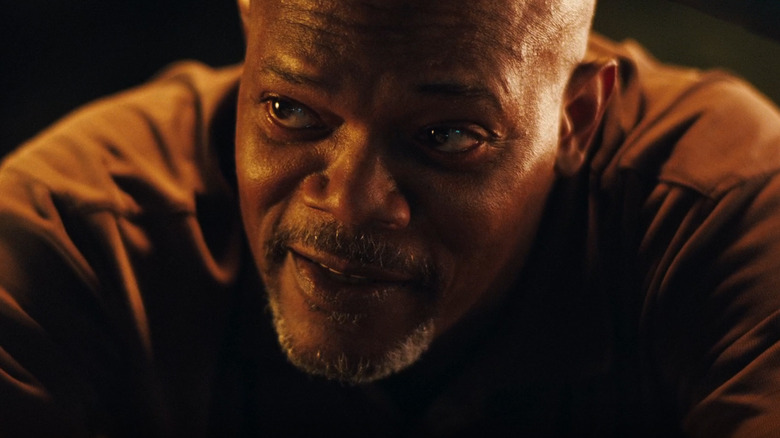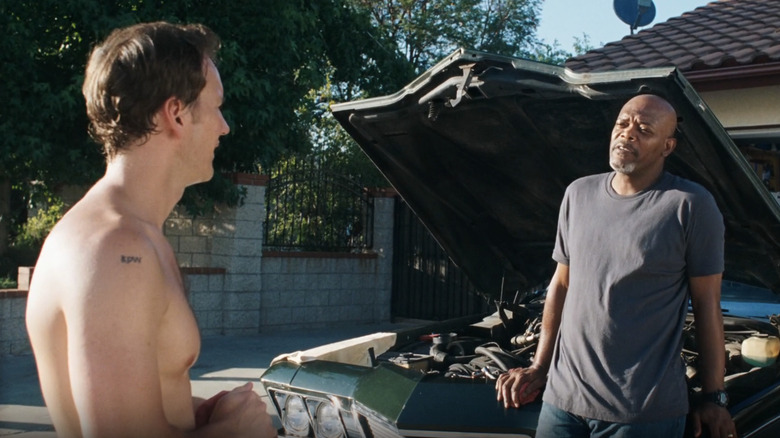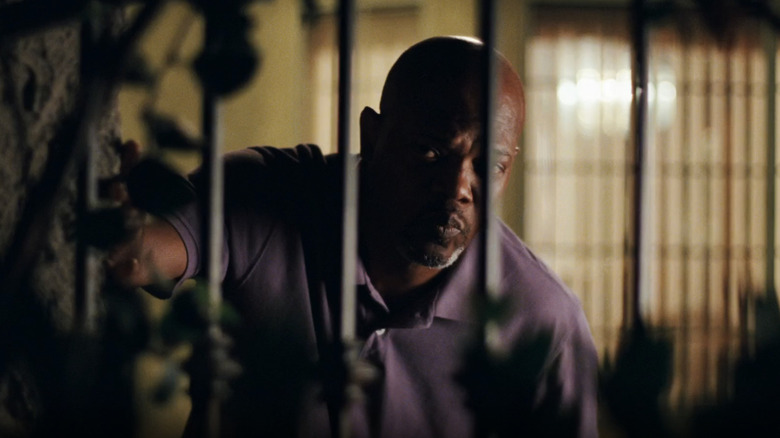A Mediocre Samuel L. Jackson Crime Thriller Received A Perfect Score From Roger Ebert
Back in 2012, when the future of film criticism looked particularly bleak in the wake of the Associated Press' decision to limit entertainment writers to 500 words, Roger Ebert wrote an impassioned defense of the profession to which he'd dedicated his life. In "Death to film critics! Hail to the CelebCult!," the esteemed film critic argued against the idea that critics were there to simply reflect the views of readers. "A newspaper film critic should encourage critical thinking," he wrote, "introduce new developments, consider the local scene, look beyond the weekend fanboy specials, be a weatherman on social trends, bring in a larger context, teach, inform, amuse, inspire, be heartened, be outraged." Throughout his career, he certainly adhered to those principles, and while there are innumerable reviews that exemplify this commitment, perhaps the best is his effusive appraisal of "Lakeview Terrace" (though Ebert's negative take on a certain Oscar-winning '90s crime thriller is also a good example).
Directed by Neil LaBute, this 2008 crime thriller starred Samuel L. Jackson as Abel Turner, an unnerving Los Angeles police officer who becomes incensed when an interracial couple, played by Patrick Wilson and Kerry Washington, moves into the house next door to him. Having appointed himself the watchdog of his quiet suburban neighborhood, Turner elects to make the new arrivals' lives a living hell by taking increasingly hostile actions, which eventually prompt the newlyweds to fight back. It all culminates in a wild final act that most critics considered somewhat of a copout (no pun intended), given the film's ostensible earlier attempts to grapple with race issues. Ebert, however, was not one of these critics.
Most critics didn't like Lakeview Terrace, but Roger Ebert loved it
When Roger Ebert gave his opinion on film, it carried more weight than arguably any other voice in the field. He was, after all, the first film critic to win the Pulitzer Prize for criticism, but his cultural relevance and impact were just as important, if not more so. Long before Rotten Tomatoes (the success of which is, ironically, arguably Ebert's fault) turned movie criticism into a binary game of "Fresh" and "Rotten," the Chicago Sun-Times columnist was out there "encouraging critical thinking" with his always thoughtful prose. He wasn't always "right" (he gave Ben Affleck's dismal "Daredevil" three stars while only awarding "A Clockwork Orange" with two on a scale of four), but he was always reflective and insightful.
Still, nobody could have seen Ebert's review of "Lakeview Terrace" coming. The middling thriller garnered a 44% score on Rotten Tomatoes, which, again, isn't the best gauge but is instructive in this instance. Critics were mostly unimpressed, with The Wall Street Journal's Joe Morgenstern seemingly let down by the film's style, writing, "The movie's only mark of restraint is the absence of an earthquake." Meanwhile, Wesley Morris of the Boston Globe managed to show some restraint of his own, opining that the movie "might have something to say about Black racism, but the conversations go nowhere, and the cliches of the genre take over." That seems to be the real crux of critics' distaste for "Lakeview Terrace," with Deborah Ross of The Spectator focusing on the third act and its indulgence in "genre convention" resulting in "a shoot-out of the utmost silliness." In his review for the Philadelphia Inquirer, Steven Rea similarly took issue with the film's "frantic, far-fetched climax," writing that by the time the final act plays out, the movie's "pretense at exploring racial intolerance has been exposed for what it really is: a B-movie copout."
In these critics' opinions, then, if the movie had something to say about race in the U.S., it was abandoned part-way through. Then again, several writers didn't think it had much to say at all, with Joe Neumaier of the New York Daily News writing, "'Terrace' pretends to be about the persecution of a mixed-race couple when really it's about how anyone might react living next door to the shark from 'Jaws.'" Ebert, on the other hand, not only like the movie, but he also gave it a perfect four stars.
Roger Ebert found his own philosophy in Lakeview Terrace
To be clear, Roger Ebert handed out perfect scores plenty of times, bestowing the honor on Clint Eastwood and Matt Damon's "Hereafter," 1972's "The Red Mantle," and 2012's "The Kite," just to name a few. He was also not the only critic who liked "Lakeview Terrace." Nigel Andrews of the Financial Times gave the film a positive review, opining that Samuel L. Jackson played his role "with wicked finesse." But a four-star review? What impressed Ebert so much? Well, for one thing, he thought the casting of Jackson as the "racist" neighbor was inspired as it "creates a presumption of innocence that some will hold on to longer than the story justifies." Had the roles been reversed, in Ebert's opinion, viewers would not have to grapple with their automatically favorable view of the psychopath next door. For him, this prompted tough questions that audiences had no choice but to face. "Is this movie racist for making the villain Black or would it be equally racist by making the villain white?" he asks in his review. "Well? What's your answer?"
The film's willingness to pose such uncomfortable questions and present difficult moral choices seems to have been what prompted Ebert's enthusiasm. Later in his review, he praised director Neil LaBute for asking equally tough questions about Patrick Wilson's character Chris and his commitment to his wife. "Even while making a superb thriller," wrote Ebert, "LaBute makes the film more than that. It deals with one of his themes, the difficult transition from prolonged adolescence to manhood." While most critics felt the film abandoned its commitment to exploring deeper ideas mid-way through, Ebert thought it stayed with them throughout, ultimately finding that while he knew which of the characters were "good and bad or strong and weak," he wasn't sure if they did.
In the end, it seems Ebert found in "Lakeview Terrace" the very thing he valued about film criticism: critical thinking. "I find movies like this alive and provoking," he wrote, "and I'm exhilarated to have my thinking challenged at every step of the way." That was what Ebert was all about — challenging his readers to think more deeply and critically. Evidently, he found "Lakeview Terrace" to do just that.


